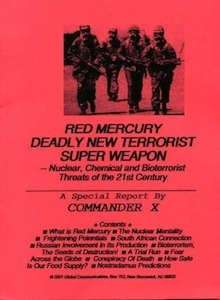That Baffling Last Act
 Perhaps I am bucking for a karmic penalty here, but let me take a brief moment to speak slightly ill of the dead. Neutron-bomb inventor Samuel T. Cohen, who passed away four days ago, was always a controversial figure, and not just because of his role in the atomic-weapons industry. As previously highlighted on Microkhan, Cohen was prone to making wildly exaggerated statements about his own genius and importance, and he obviously operated with a massive chip on his shoulder. But even Cohen opponents could not deny his technical brilliance—the Cold War-era RAND Corporation didn't tap dummies for its inner circle.
Perhaps I am bucking for a karmic penalty here, but let me take a brief moment to speak slightly ill of the dead. Neutron-bomb inventor Samuel T. Cohen, who passed away four days ago, was always a controversial figure, and not just because of his role in the atomic-weapons industry. As previously highlighted on Microkhan, Cohen was prone to making wildly exaggerated statements about his own genius and importance, and he obviously operated with a massive chip on his shoulder. But even Cohen opponents could not deny his technical brilliance—the Cold War-era RAND Corporation didn't tap dummies for its inner circle.
Cohen may have longed to be regarded as an equal of J. Robert Oppenheimer and Edward Teller, but he did his legacy no favors in his waning years by constantly spouting off about a substance of dubious provenance: red mercury:
In recent years, Mr. Cohen prominently warned of a black market substance called red mercury, supposedly capable of compressing fusion materials to detonate a nuclear device as small as a baseball — ideal for terrorists. Most scientists call the substance mythical, and stories about it, many circulating on the Internet, are widely regarded as spurious.
Indeed, red mercury last made news two summers ago, when rumors swirled around Saudi Arabia that the substance was embedded in Singer sewing machines. Before that, it figured prominent in several smuggling hoaxes centered in the former Soviet Union. Cohen's insistence on the veracity of the red mercury threat is akin to Freeman Dyson suddenly warning the world about the illicit admantium trade.
The question, then, is why a man of Cohen's obvious intellectual prowess could be so easily duped by hokum. And I have to wonder whether his gullibility was simply a product of the aging process, which has been known to diminish critical thinking skills far more than ambition. Cohen wanted to stay relevant, and that meant finding a crusade that would set him in opposition to the establishment that had never embraced his life's work. Unfortunately, Cohen settled on a cause of little worth, perhaps because the years had worn away his mental acuity. (He doesn't appear to have embraced the red-mercury issue until his late 70s.)
This isn't the first time that an accomplished, outspoken figure has tarnished their legacy by touting false theories in their golden years. Cohen's tale reminds me of the final years of Pierre Salinger, the former White House official whose name is now synonymous with conspiratorial nuttiness. Sad stuff, but I do understand the impulse. No one wants to admit that their heyday is over, and so they grasp for ways to stay in the conversation. And that can lead to really poor decisions by otherwise brilliant folks.




